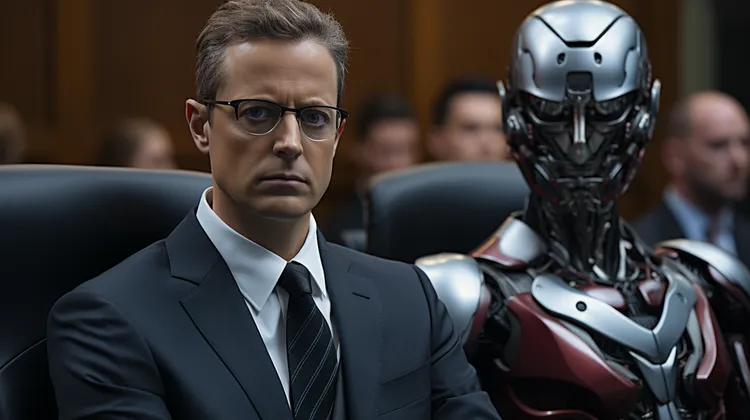The Department of Justice (DOJ) has recently made a controversial move to block Sam Bankman-Fried, the prominent crypto entrepreneur and founder of FTX exchange, from bringing up a raise he participated in for the AI research company, Anthropic, in an ongoing court case. This decision has raised many eyebrows within the tech and legal communities, as it restricts Bankman-Fried’s ability to present potentially critical evidence in his defense.
The case against Bankman-Fried stems from allegations of market manipulation and insider trading in the cryptocurrency sphere. The DOJ claims that Bankman-Fried used his massive influence and deep pockets to have undue control over certain digital assets, artificially influencing their prices to benefit himself and his interests. The trial has caught the attention of the crypto world, as it could have significant ramifications for the industry as a whole.
Bankman-Fried’s involvement with Anthropic, a company that is developing highly advanced artificial intelligence (AI) systems, is an important piece of evidence that he believes could shed light on his innocence. The raise in question involved Bankman-Fried investing a substantial amount of money into Anthropic’s project, which aims to develop AI technology that can solve complex real-world problems. The entrepreneur had hoped to use the raise as evidence of his genuine interest in advancing the field of AI, thus contradicting the DOJ’s portrayal of him as a malicious market manipulator.
The DOJ’s argument against bringing up the Anthropic AI raise in court centers around the notion that it is irrelevant to the charges at hand. They assert that Bankman-Fried’s involvement in AI research has no logical connection to the alleged market manipulation, and therefore, it should be excluded from the trial. This decision by the DOJ has sparked a heated debate over the boundaries of evidence admissibility in complex financial cases.
Critics of the DOJ’s move argue that the Anthropic AI raise is directly connected to Bankman-Fried’s character and his general motivations, which are critical factors when assessing his potential guilt or innocence. They claim that by preventing him from presenting this evidence in court, the DOJ is unduly restricting his ability to mount a robust defense. They argue that it sets a troubling precedent for future cases involving intricate financial maneuvers and complex digital ecosystems.
On the other hand, the DOJ argues that allowing the Anthropic AI raise to be brought up in court would only serve to distract and confuse the jury. They maintain that the relevant issue at hand is whether Bankman-Fried engaged in market manipulation or insider trading, and any evidence or argumentation that strays away from this central question should not be considered. They highlight the importance of maintaining focus during the trial and ensuring that the case remains centered on the specific charges being levied against the defendant.
The decision on whether to allow Bankman-Fried to present evidence regarding the Anthropic AI raise ultimately lies in the hands of the presiding judge. The responsibility falls on them to determine the relevance and admissibility of such evidence, weighing the arguments presented by both the defense and prosecution. The judge’s ruling in this case will undoubtedly have far-reaching implications for future trials involving emerging technologies and intricate financial systems.
The outcome of this dispute could also impact the perception of AI technology within the legal system. If Bankman-Fried is allowed to present evidence related to the Anthropic AI raise and successfully links it to his character and motivations, it could set a precedent for considering an individual’s involvement in cutting-edge technologies as a positive factor in determining legal culpability. Conversely, if the DOJ’s argument prevails, it might curtail the defense’s ability to leverage advancements in technology to shape public perception and influence legal outcomes.
The DOJ’s attempt to block Sam Bankman-Fried from presenting evidence concerning the Anthropic AI raise in a court case alleging market manipulation has generated significant controversy. While the DOJ argues that such evidence is irrelevant, critics argue that it is crucial for understanding Bankman-Fried’s motivations and character. The ruling on this matter will not only impact Bankman-Fried’s case but also establish a precedent for future trials involving emerging technologies and complicated financial systems. The outcome may shape the future of AI and its implications within the legal system, as well as question the limits of evidence admissibility in complex financial cases.




The arguments from both sides are compelling. It’s a tough decision for the judge, but one that will shape the future of legal proceedings involving emerging technologies!
The DOJ’s decision has certainly sparked a heated debate. It’s important to consider all relevant evidence to ensure a fair trial.
I can’t help but question the DOJ’s motives in blocking Bankman-Fried’s evidence. It seems like they’re trying to skew the trial in their favor!
This is ridiculous! The DOJ is clearly trying to silence Bankman-Fried and prevent him from presenting vital evidence in his defense.
The DOJ is just trying to manipulate the trial by blocking Bankman-Fried’s evidence. They’re scared of the truth coming out!
The debate around evidence admissibility is crucial for maintaining transparency and ensuring justice is served!
The trial of Sam Bankman-Fried could be a game-changer for the crypto industry. Let’s hope transparency and fairness prevail!